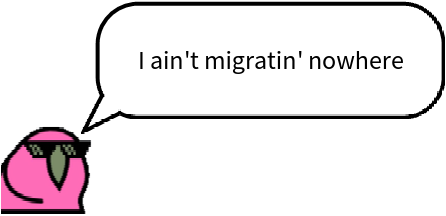Wolfram Function Repository
Instant-use add-on functions for the Wolfram Language
Function Repository Resource:
Check if an object exists
ResourceFunction["ObjectExistsQ"]["Register",head,test] registers test as the function to call for objects of Head head in ResourceFunction["ObjectExistsQ"]. |
Check if a PermissionsGroup exists:
| In[1]:= |
| Out[1]= |
Use CreatePermissionsGroup to create the group:
| In[2]:= |
Now it exists:
| In[3]:= |
| Out[3]= |
Create a BoxObject and CellObject:
| In[4]:= | ![cell = ResourceFunction[
"PrintAsCellObject"][{ResourceFunction["WolfieSay"][
"Are you my bestie?"], DynamicWrapper[ResourceFunction["BirdSay"]["Umm....."], box = EvaluationBox[]]}]](https://www.wolframcloud.com/obj/resourcesystem/images/77a/77ac25f1-7ef8-46bf-8794-0b065ae73ed7/3d9fad69cfa99a52.png) |
| Out[4]= |
Both exist:
| In[5]:= |
| Out[5]= |
Both can be deleted with NotebookDelete:
| In[6]:= |
| In[7]:= |
| Out[7]= |
| In[8]:= |
| In[9]:= |
| Out[9]= |
Using ChannelObject does not actually create a channel:
| In[10]:= |
| Out[10]= |
Using CreateChannel makes the channel live:
| In[11]:= |
| In[12]:= |
| Out[12]= |
Using CloudObject does not actually create a cloud object:
| In[13]:= |
| Out[13]= |
Using CloudPut or similar functions creates the object:
| In[14]:= |
| In[15]:= |
| Out[15]= |
A DatabaseReference exists if it is backed by a file that exists or if it is connected:
| In[17]:= |
| Out[17]= |
| In[18]:= |
| Out[18]= |
External sessions exist while they are active:
| In[19]:= |
| Out[19]= |  |
| In[20]:= |
| Out[20]= |
Use DeleteObject to end the session:
| In[21]:= |
Now, the session no longer exists:
| In[22]:= |
| Out[22]= |
For a LocalObject, ObjectExistsQ is equivalent to FileExistsQ:
| In[25]:= |
| Out[25]= |
Use Put to create the local object:
| In[26]:= |
| In[27]:= |
| Out[27]= |
A NotebookObject exists only if the window has not been closed:
| In[28]:= |
| Out[28]= |
| In[29]:= |
| Out[29]= |
Closing the window destroys the NotebookObject:
| In[30]:= |
| In[31]:= |
| Out[31]= |
Check if a PermissionsGroup exists:
| In[32]:= |
| Out[32]= |
Create the group with CreatePermissionsGroup:
| In[33]:= |
Now it exists:
| In[34]:= |
| Out[34]= |
Using PersistentObject does not actually create a persistent object:
| In[35]:= |
| Out[35]= |
| In[36]:= |
| Out[36]= |
Assign a value to create the object:
| In[37]:= |
| Out[37]= |
Now it exists:
| In[38]:= |
| Out[38]= |
Check if a ResourceFunction exists:
| In[39]:= |
| Out[39]= |
| In[40]:= |
| Out[40]= |
Delete the resource:
| In[41]:= |
| In[42]:= |
| Out[42]= |
Functions published in the Wolfram Function Repository always exist:
| In[43]:= |
| Out[43]= |
| In[44]:= |
| Out[44]= |  |
Check if a SearchIndexObject exists:
| In[46]:= |
| Out[46]= |  |
| In[47]:= |
| Out[47]= |
Delete the index:
| In[48]:= |
| In[49]:= |
| Out[49]= |
A task only exists until it is complete:
| In[50]:= |
| Out[50]= |  |
| In[51]:= |
| Out[51]= |
Once completed, it no longer exists:
| In[52]:= |
| Out[52]= |
Test if an InputStream or OutputStream is open:
| In[55]:= |
| In[56]:= |
| Out[56]= |
| In[57]:= |
| Out[57]= |
Close the stream:
| In[58]:= |
| Out[58]= |
| In[59]:= |
| Out[59]= |
Strings are either interpreted as URLs or files:
| In[60]:= |
| Out[60]= |
| In[61]:= |
| Out[61]= |
| In[62]:= |
| Out[62]= |
Unknown object types give False:
| In[63]:= |
| Out[63]= |
Register a new object type:
| In[64]:= |
| Out[64]= |
Now the specified function is used on the object type to determine whether it exists:
| In[65]:= |
| In[66]:= |
| Out[66]= |
| In[67]:= |
| Out[67]= |
This work is licensed under a Creative Commons Attribution 4.0 International License